The International Student Vibe in Thunder Bay
*Ceci est seulement disponible en anglais
March 3, 2020 - This blog first appeared in The Walleye Magazine, September issue
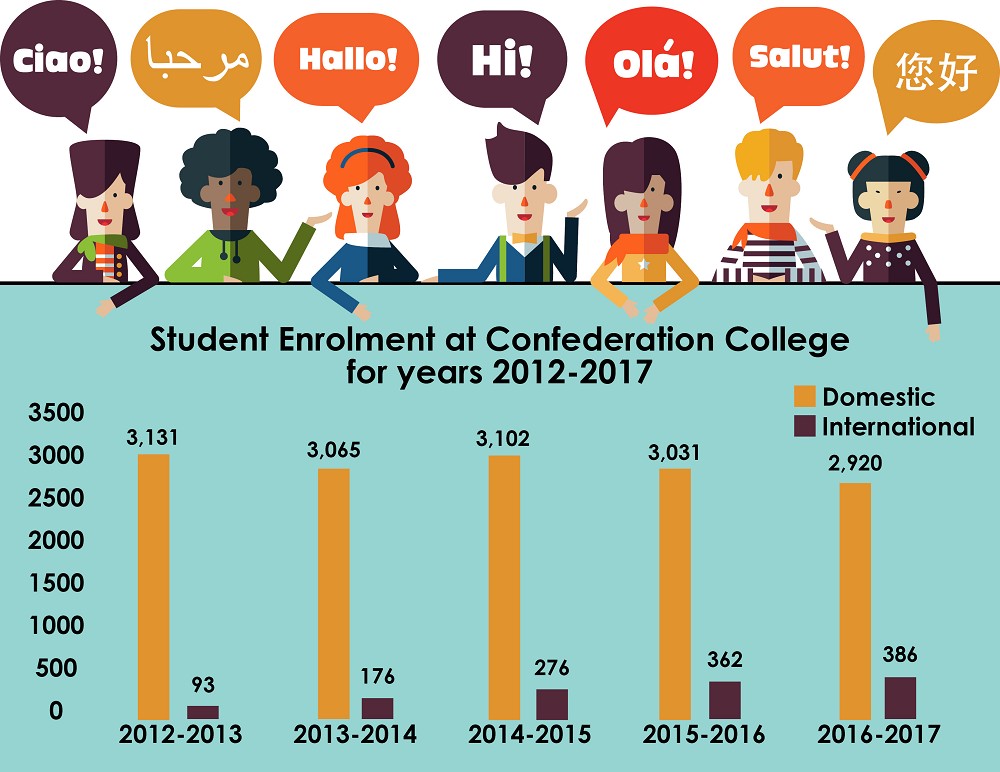
International students can play a vital role as the solution to labour shortages in Canada with their ability to quickly integrate in the job market after their studies as compared to internationally-trained immigrants. Other positive aspects of international students are their large contributions to Canada’s economy and the important diversity they add to their communities. Between 2015 and 2016, international students in Ontario contributed to over 6.3 billion of Canada’s GDP. Statistics for full-time international students that attend Lakehead University and Confederation College are found below. This data was retrieved from Ontario Open Data Sets, as well as Statistics Canada.
Student Enrolment
Interestingly, the number of international students at Lakehead University and Confederation College increased between 2012 and 2017 by 247% and 315%, respectively. This positive trend is not observed for the domestic student enrolment, which has a decrease by 9% and 7% over the same years at Lakehead and Confederation, respectively.
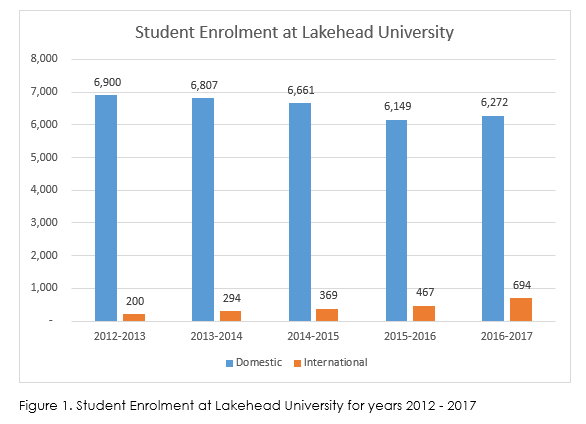
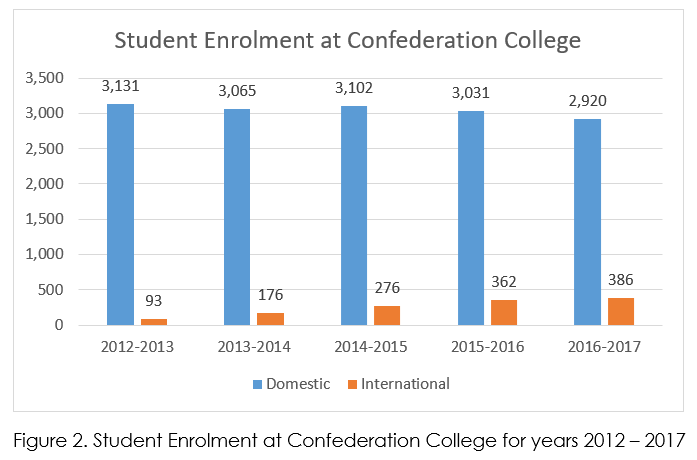
Percentage of International Students
Confederation College had the second largest proportion of its student body as international students with 12% for the school year 2016 – 2017 when comparing to all colleges that have campuses in Northern Ontario. In addition, Confederation had a proportion of international students 3% above the national average – that’s something to be proud of! Lakehead University had 10% of its student enrolment as international students in 2016 – 2017, which ranked it third among all the Northern Ontario universities. Université de Hearst and Algoma University both had a higher proportion of international students with 40% and 26%, accordingly.
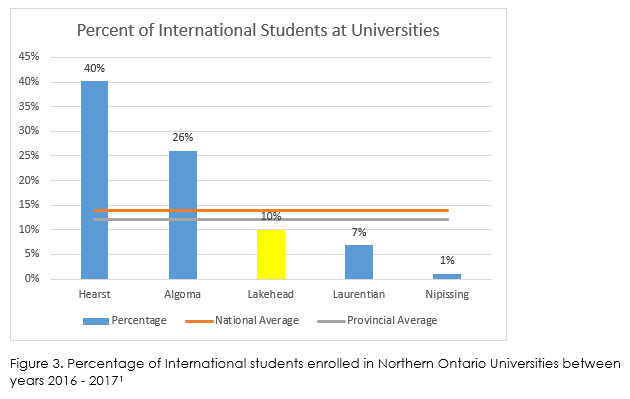
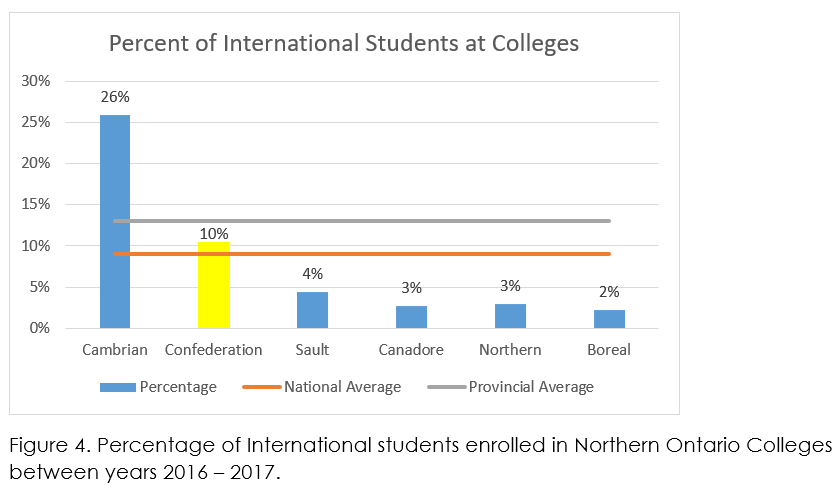
International Students by Country of Origin
It is interesting to analyze the most common countries of origin for international students attending Lakehead University and Confederation College. The top three countries of origin for Lakehead University were China, India and Saudi Arabia for the years 2014 – 2017. For Chinese international students, the enrolment numbers increased from 132 in 2014/2015 to 237 in 2016/2017, which is an 80% growth rate. The number of international students coming from India started as 86 in 2014/2015 and increased to 174 in 2016/2017 – a growth rate of 102%. The growth rate of Saudi students is 279%, jumping from 38 students to144 for the same period, which is the fastest growth rate compared to Chinese and Indian students!
The top three countries of origin for Confederation College were India, China and South Korea for the years 2014 – 2017. For Indian students, the numbers enrolled increased by 55% from 166 students in 2014/2015 to 257 in 2016/2017. There were 27 Chinese and 25 South Korean international students in 2014/2015 at Confederation College. In 2017/2018, there were 55 Chinese students and 20 South Korean students. While the enrolment rate of international students for China grew by 104%, it declined for South Korea by 20%.
[1] The numbers of international students at certain colleges are likely inflated. Many colleges have secondary campuses for international students that are not located in Northern Ontario. Therefore, it is likely that many of these enrolments are not at Northern Ontario campuses. This is not the case for the universities, however. Northern universities do not have as many satellite campuses.
Écrivez pour nous
Maia Kvas and Irina Chen and Hilary Hagar are former Experience North students at NPI.
Thank you to our Experience North Sponsor 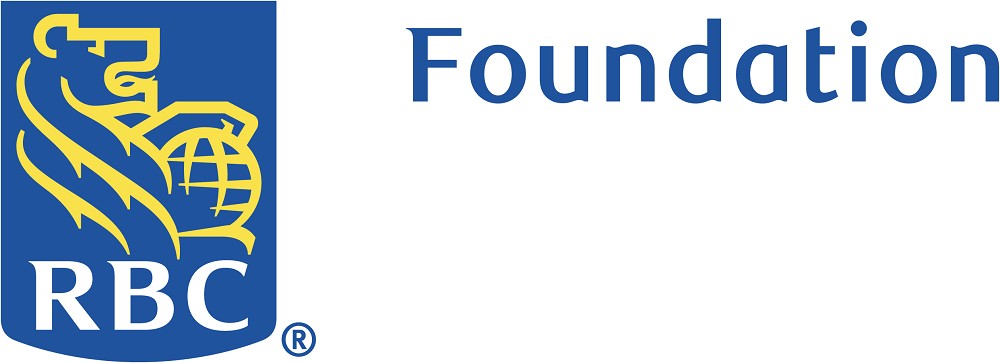
Le contenu du Puces Politiques du Nord est pour l’information et l’utilisation générales. Les vues exprimées dans ce blogue sont celles de l’auteur et ne reflètent pas nécessairement les opinions de l’Institut des politiques du Nord, de son conseil d’administration ou de ses partisans. Chaque auteur assume toute la responsabilité quant à la précision et à l’intégralité de son blogue. L’Institut des politiques du Nord ne sera pas tenu responsable d’une erreur ou d’une omission dans cette information, ni d’un dommage causé par l’exposition ou l’utilisation de cette information. Tout lien vers un autre site Web ne signifie pas que l’Institut des politiques du Nord est d’accord avec le contenu de ce site, ni qu’il y assume une responsabilité.
L’Institut des politiques du Nord vous invite à lui faire part de vos observations et commentaires. Cette rétroaction ne doit pas dépasser 500 mots. Nous ne publierons aucun commentaire comportant des propos obscènes, désobligeants, haineux ou menaçants. Évitez le hors sujet en vous assurant que vos commentaires concernent les thèmes abordés dans ce blogue. Si vous présentez une réfutation ou un contre-argument, veuillez fournir des sources et des éléments de preuve. L’Institut des politiques du Nord se réserve le droit de refuser les rétroactions et commentaires transmis à www.northernpolicy.ca qui contreviennent aux présentes directives.
